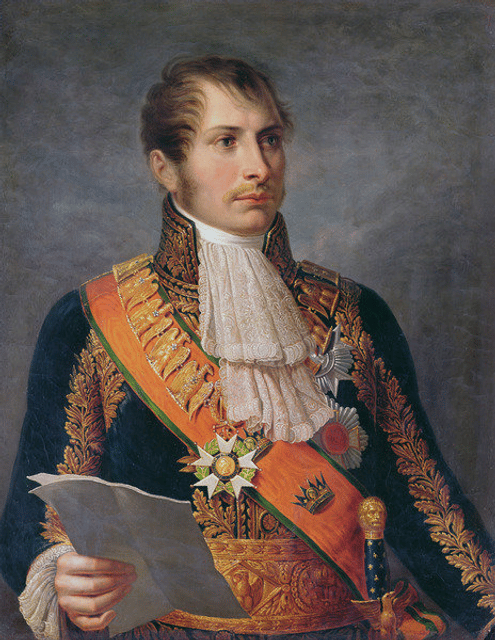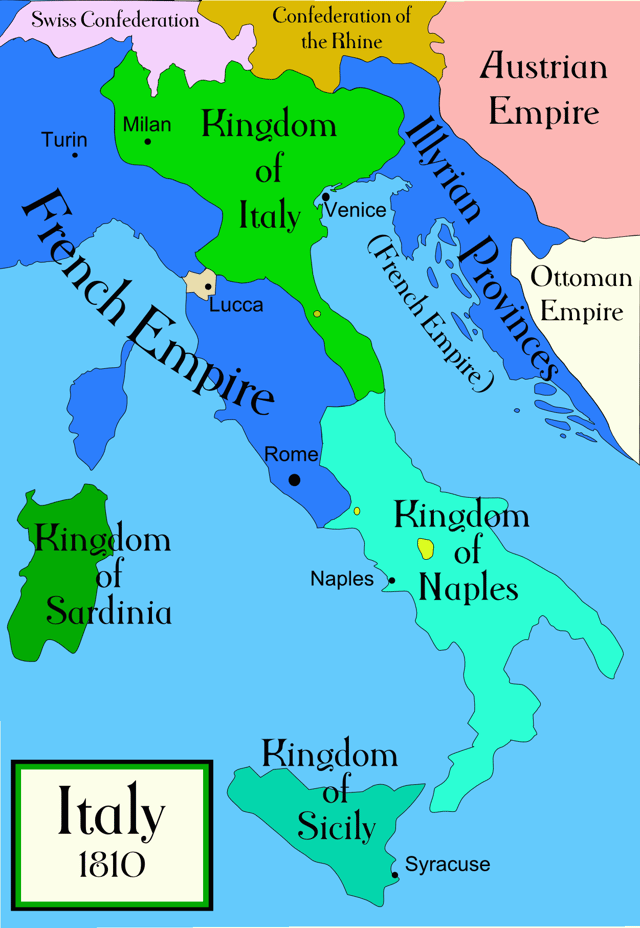Eugène de Beauharnais

Eugène de Beauharnais

| Eugène de Beauharnais | |||||
|---|---|---|---|---|---|
| French Prince, Prince of Venice, Grand Duke of Frankfurt, Duke of Leuchtenberg, Prince of Eichstätt | |||||
| Viceroy of Italy | |||||
| Term | 5 June 1805 – 11 April 1814 | ||||
| Monarch | Napoleon I | ||||
| Duke of Leuchtenberg Prince of Eichstätt | |||||
| Tenure | 14 November 1817 –21 February 1824 | ||||
| Successor | Auguste de Beauharnais | ||||
| Born | 3 September 1781 Paris, France | ||||
| Died | 21 February 1824(1824-02-21)(aged 42) Munich, Bavaria | ||||
| Burial | St. Michael's Church, Munich | ||||
| Spouse | Princess Augusta of Bavaria (m. 1806) | ||||
| Issue | Josephine, Queen of Sweden Eugénie, Princess of Hohenzollern-Hechingen Auguste, Prince Consort of Portugal Amélie, Empress of Brazil Théodoline, Countess Wilhelm of Württemberg Princess Carolina Maximilian, 3rd Duke of Leuchtenberg | ||||
| |||||
| House | Beauharnais | ||||
| Father | Alexandre de Beauharnais | ||||
| Mother | Joséphine Tascher de la Pagerie | ||||
| Religion | Roman Catholicism | ||||
| Full name | |||||
| Eugène Rose de Beauharnais | |||||
Eugène Rose de Beauharnais, Duke of Leuchtenberg ([ø.ʒɛn də‿bo.aʁ.nɛ]; 3 September 1781 – 21 February 1824) was the first child and only son of Alexandre de Beauharnais and Joséphine Tascher de la Pagerie, first wife of Napoleon I.
He was born in Paris, France, and became the stepson and adopted child (but not the heir to the imperial throne) of Napoleon I. His biological father was executed during the revolutionary Reign of Terror. He commanded the Army of Italy and was Viceroy of Italy under his stepfather.
Historians consider him one of the ablest of Napoleon's relatives.[1]
| Eugène de Beauharnais | |||||
|---|---|---|---|---|---|
| French Prince, Prince of Venice, Grand Duke of Frankfurt, Duke of Leuchtenberg, Prince of Eichstätt | |||||
| Viceroy of Italy | |||||
| Term | 5 June 1805 – 11 April 1814 | ||||
| Monarch | Napoleon I | ||||
| Duke of Leuchtenberg Prince of Eichstätt | |||||
| Tenure | 14 November 1817 –21 February 1824 | ||||
| Successor | Auguste de Beauharnais | ||||
| Born | 3 September 1781 Paris, France | ||||
| Died | 21 February 1824(1824-02-21)(aged 42) Munich, Bavaria | ||||
| Burial | St. Michael's Church, Munich | ||||
| Spouse | Princess Augusta of Bavaria (m. 1806) | ||||
| Issue | Josephine, Queen of Sweden Eugénie, Princess of Hohenzollern-Hechingen Auguste, Prince Consort of Portugal Amélie, Empress of Brazil Théodoline, Countess Wilhelm of Württemberg Princess Carolina Maximilian, 3rd Duke of Leuchtenberg | ||||
| |||||
| House | Beauharnais | ||||
| Father | Alexandre de Beauharnais | ||||
| Mother | Joséphine Tascher de la Pagerie | ||||
| Religion | Roman Catholicism | ||||
| Full name | |||||
| Eugène Rose de Beauharnais | |||||
Life and Career

Eugène c. 1800, Andrea Appiani.

Napoleonic Italy c. 1810.
Eugène's first campaign was in the Vendée, where he fought at Quiberon. However, within a year his mother Joséphine had arranged his return to Paris. In the Italian campaigns of 1796–1797, Eugène served as aide-de-camp to his stepfather, whom he also accompanied to Egypt. In Egypt, Eugène was wounded during the Siege of Acre (1799) and returned to France with Napoleon in the autumn of 1799, helping to bring about the reconciliation of the General and his mother, who had become estranged due to the extramarital affairs of both. During the Coup of Brumaire, Eugène accompanied Napoleon to Saint-Cloud, where the legislative assemblies were brought into submission.
By a decree of 1 February 1805 Eugène was created Arch-Chancellor of State the French Empire.
As commander of the Imperial Guard (successor to the Consular Guard), Eugène preceded his step-father to Milan ahead of Napoleon's coronation as King of Italy on 26 May 1805. Napoleon had originally intended to place his brother Joseph on the Italian throne and then, after Joseph's refusal, his nephew Napoléon Charles, the son of Louis Bonaparte and Eugène's sister, Hortense. However, both Joseph and Louis refused and so Napoleon instead placed the Iron Crown upon his own head. During the coronation Napoleon handed the royal ring and mantle to his stepson and on 7 June 1805 announced Eugène's appointment as Viceroy of Italy to the Italian Legislative Assembly.
During the War of the Fifth Coalition, Eugène was put in command of the Army of Italy, with General Étienne-Jacques-Joseph-Alexandre MacDonald as his military advisor. In April 1809 he fought and lost the Battle of Sacile against the Austrian army of the Archduke John, but Eugène's troops decisively won the rematch at the Battle of the Piave in May and the Battle of Raab in June. After the Battle of Aspern-Essling, Napoleon recalled the Army of Italy to Austria. After joining the main army on the island of Lobau in the Danube, Eugène took part in the Battle of Wagram.
During the Russian campaign, Eugène again commanded the Army of Italy (IV Corps) with which he fought in the Battle of Borodino and the Battle of Maloyaroslavets. After Napoleon and then Joachim Murat had left the retreating army, Eugène took command of the remnants and led it back to Germany in 1813.
During the campaign of 1813, Eugène fought in the Battle of Lützen. Napoleon then sent him back to Italy, where he organised the defence against the Austrians, holding out on the Mincio until the abdication in 1814. After the fall of Napoleon in 1814, Eugène retired to Munich and at the behest of his father-in-law King Maximilian of Bavaria, did not get involved with Napoleon and France again.
Eugène de Beauharnais died on 21 February 1824 in Munich.
Status and titles
On 14 June 1804 he was made an official member of the imperial family as His Imperial Highness, French Prince (Prince français) Eugène de Beauharnais. By a statute of 5 June 1805 the Emperor added Viceroy of Italy to his titles.
Eugène was adopted by Napoleon on 12 January 1806, though excluded from succession to the French Empire. On 16 February 1806, Eugène was declared heir presumptive to the Kingdom of Italy, in the absence of a second son of Napoleon. On 20 December 1807 he was given the title of Prince de Venise ("Prince of Venice"), a title created on 30 March 1806, when the Venetian Province taken from Austria in 1805 was united to Bonaparte's Kingdom of Italy.
In 1810, Napoleon used his influence over Karl von Dalberg, Archbishop of Regensburg and Grand Duke of Frankfurt, to name Eugène as constitutional heir of the grand duchy. Von Dalberg abdicated on 26 October 1813 due to Frankfurt's imminent conquest by the allied armies, and Eugène became nominal grand duke until Frankfurt was occupied by the allies in December of that same year.
A further imperial sinecure was Archichancelier d'État de l'Empire de France ("Archchancellor of State of the Empire of France").
He was an active Freemason and was involved in setting up the Grand Orient of Italy and its Supreme Council.[3]
Heraldry
Family
On 14 January 1806, two days after his adoption by Napoleon, Eugène married Princess Augusta Amalia Ludovika Georgia of Bavaria (1788–1851), eldest daughter of Napoleon's ally, King Maximilian I Joseph of Bavaria. On 14 November 1817, his father-in-law made him Duke of Leuchtenberg and Prince of Eichstätt.
Eugène and Augusta had seven children:
Princess Joséphine Maximiliane Eugénie Napoléonne de Beauharnais (1807–1876); became the Queen Consort to King Oscar I of Sweden, himself the son of Napoleon's old love, Désirée Clary.
Princess Eugénie Hortense Auguste de Beauharnais (1808–1847); married Friedrich, Prince of Hohenzollern-Hechingen.
Prince Auguste Charles Eugène Napoléon de Beauharnais, 2nd Duke of Leuchtenberg (1810–1835); married Queen Maria II of Portugal. There was no issue from this marriage.
Princess Amélie Auguste Eugénie Napoléone de Beauharnais (31 July 1812 – 26 January 1873); was the second wife of Pedro I of Brazil (father of Maria II of Portugal) and became Empress of Brazil.
Princess Theodelinde Louise Eugénie Auguste Napoléone de Beauharnais (1814–1857); married Wilhelm, 1st Duke of Urach.
Princess Carolina Clotilde de Beauharnais (1816)
Prince Maximilian Josèphe Eugène Auguste Napoléon de Beauharnais (1817–1852); married Grand Duchess Maria Nikolaievna of Russia, eldest daughter of Tsar Nicholas I of Russia, and received the title of "Prince Romanovsky", addressed as "His Imperial Highness", in 1852.
A biography by Carola Oman, Napoleon's Viceroy, Eugène de Beauharnais, appeared in 1966.



